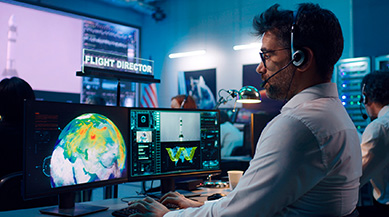Online Master of Science in Space Studies (MS)
Learn how space exploration facilitates breakthrough discoveries about our universe. The Master of Science in Space Studies program at American Military University (AMU) examines how researchers uncover new findings through human space flight and remote sensing technologies.

Explore the AMU Online Master of Science in Space Studies (MS)
This online master’s degree program in space studies examines how scientific inquiry provides new insights into our solar system. Students discuss the laws of space science as they review the ongoing evolution of our country’s space program. Courses also address aerospace science, astronomy, earth and planetary sciences, and space policy.
Originally designed by a former NASA astronaut, the space studies curriculum examines the challenges associated with space exploration from these perspectives:
- Political
- Economic
- Legal
- Commercial
- Scientific
- Technical
Students may participate in hands-on research projects, as well. Students who participate in the Exoplanet Research Group and/or the Supernova Search Research Program gain access to telescope images acquired from our Wallace E. Boston Observatory. The Observatory houses a research-grade, 24-inch aperture PlaneWave telescope with remote control functionality and is part of the Skynet Robotic Telescope Network. Performing astronomical research allows students to apply knowledge gained in the classroom to real-life contexts.
These groups, along with AMU’s online classes, are led by highly respected experts in the field. Space studies faculty members include scientists and engineers currently working for NASA and aerospace firms.
Explore the Nuances of Space Exploration with a Degree Concentration
Core courses in this master’s degree program introduce students to myriad scientific and political aspects of space exploration. Concentration tracks provide the opportunity to review these topics in greater depth.
Select a concentration to learn more.
About the Concentration
Provides an in-depth study in the discipline, with emphasis in both aircraft and spacecraft design/operations. Students take courses with comprehensive overviews of such topics as aircraft propulsion, aerodynamics and, aircraft design in addition to learning about orbital mechanics, rocket propulsion, and spacecraft design.
Program Objectives
Upon successful completion of this concentration, the student will be able to:
- Categorize the laws of orbital mechanics -- calculate and illustrate the effects that gravity has on two-body mechanics including spacecraft maneuvers such as transfer orbits and rendezvous.
- Apply scientific principles and calculate problems related to aircraft propulsion systems.
- Examine liquid and solid rocket propulsion fundamentals including propellants, combustion principles, components, and general turbo-pump, and motor design.
- Assess the development, technology, and importance of satellite communications in our modern technological society.
- Synthesize the fundamentals of aerodynamics and aircraft/spacecraft design, building upon past and current technology to shape innovations for the future.
About the Concentration
A diverse range of courses provide an inclusive synopsis of astronomy – from the Solar System to stars and galaxies. You will learn about astronomical instrumentation, with the opportunity to access the university’s observatory and the PlaneWave CDK24 robotic telescope.
Program Objectives
Upon successful completion of this concentration, the student will be able to:
- Demonstrate an in-depth understanding of Solar System -- including planets, comets, asteroids, and meteorites.
- Analyze the celestial objects found beyond our Solar System: stars, exoplanets, galaxies, and possible extraterrestrial life.
- Evaluate the geology of the Moon and Mars as related to their significance for near future human exploration of the Solar System.
- Critique the various configurations of telescopes and their use in the exploration of all types of electromagnetic radiation – from radio waves to gamma rays.
- Synthesize the history of astronomy, from ancient Greece to our modern cosmological model of the universe.
About the Concentration
The Earth and Planetary Sciences concentration is designed to provide students with an in-depth overview of our Solar System. Topics covered include planetary geology, with special emphasis on geology of the Moon and Mars. Small Solar System objects such as natural satellites, planetary rings, comets, and asteroids are also considered. Students study the origin of atmospheres on the Earth, Venus, Mars, and Saturn’s moon Titan. Planetary mapping techniques and GIS fundamentals are considered in this concentration as well.
Program Objectives
Upon successful completion of this concentration, the student will be able to:
- Use the scientific method and scientific tools to solve programs related to the Earth and planets.
- Identify the process and features associated with the Earth and planetary interiors, landscapes, oceans, and atmospheres.
- Demonstrate a comprehensive understanding of the interrelated physical, chemical, and geological processes operating on the Earth and other planets.
- Present earth and planetary science information clearly, in multiple formats (written, oral, graphically).
- Analyze the origin, composition, and nature of planetary atmospheres.
- Explain how terrestrial moons and planets are mapped utilizing state-of-the-art GIS techniques.
- Demonstrate good scientific ethics.
About the Concentration
The program helps to cultivate leaders in the space industry, not only in NASA, but in the commercial realm of space operations. This concentration is ideal if you already have an administrative or business background. Coursework includes space diplomacy and law, space operations and organizations, as well as the historical, political, economic, legal, commercial, scientific, and technical challenges comprising this complex and rapidly changing discipline.
Program Objectives
Upon successful completion of this concentration, the student will be able to:
- Examine the political and commercial significance of major national and international space missions, projects, and operations.
- Evaluate organizations that are critical to the success of the technological advance of space infrastructure in the United States.
- Assess the status of space cooperation and diplomacy between various space faring nations.
- Synthesize space laws and how the governing institutions affect applications such as remote sensing, communications, navigation, launch services, satellite exports, and arms control.
Discover How This Space Studies Degree Can Help You Pursue Your Goals
This online program is designed to prepare graduates to pursue professional opportunities within the space industry. Students gain career-relevant skills as they learn how space exploration campaigns contribute to historic scientific discoveries.
This master’s degree in space studies equips students with in-depth knowledge of space operations and the technologies that allow us to explore the space environment. Courses also cover the physiological and psychological challenges associated with human space flight. In addition, the program addresses current space industry trends, like the commercialization of space exploration.
You will:
- Develop an appreciation of the foundations and importance of space studies in the role of human space exploration/understanding of the cosmos.
- Analyze quantitative and qualitative research and statistical data related to the support of aerospace science, astronomy, or space policy concepts.
- Assess the history, chronology, and concepts for placing manned and unmanned vehicles in space.
- Evaluate the importance of remote sensing satellites used to observe our Earth and other celestial bodies in the Solar System.
- Synthesize the psychological and physiological elements necessary to support human life in the space environment, including spacesuit design/development.
This Master of Science in Space Studies program may be well-suited to students seeking career opportunities related to space exploration. Courses address real-life issues that impact government agencies, military personnel, and private entities that comprise the space industry.
Graduates may consider roles as:
- Mission operations specialists, who analyze flight systems and operational data to help maintain safe air and space platforms
- Space surveillance analysts, who monitor celestial activity to support defense planning, detect potential threats, and protect orbital assets like communication and navigation satellites
- Geospatial intelligence analysts, who collect planetary data using remote sensing technologies to assess environmental conditions in support of strategic intelligence operations
- Defense space policy advisors, who analyze space laws, treaties, and strategic directives to guide military leaders
Courses span a range of topics, from space law to astronomy, and examine subject matter through the lens of the space industry professional. Whether you are new to the field or have experience in our country’s space program, you will be able to demonstrate career-relevant skills upon successful completion of the program.
Space studies courses teach students how to:
- Use flight systems to support aerospace mission-readiness
- Interpret celestial data to support defense planning
- Assess planetary terrain and climate conditions to help guide strategic operations
- Apply space policy frameworks to mission-critical decisions
“ What I’ve enjoyed most about the program is its flexible structure. I’ve especially appreciated the accessibility of the faculty: They are knowledgeable, approachable, and genuinely invested in student success. It has helped me to budget my time with family and work and fulfill my lifelong goals! ”
MS, Space Studies
Review the Curriculum for This Space Studies Program
IT IS HIGHLY RECOMMENDED THAT YOU HAVE PREVIOUSLY COMPLETED COLLEGE ALGEBRA BEFORE TAKING THIS COURSE
Explore Research Groups and Other Networking Opportunities for Space Studies Students
Students in this online program may participate in the University’s space-related research groups, including our:
Members gain hands-on experience with research equipment as they collect and interpret data to gather new insights into our solar system.
In addition to these research groups, AMU also hosts dozens of student clubs and organizations. Some notable examples include Students for the Exploration and Development of Space and AMU’s American Institute of Aeronautics and Astronautics chapter.
Learn more about student life and campus leadership opportunities at American Military University.
Signature Skills: A Learning Revolution
Integrated into our student curriculum, these signature skills teach you how to move through the world with confidence. The road to success is paved with signature skills learned at APUS.
-

Encouraging students to use current technologies, critically evaluate emerging tools, and responsibly engage with digital and AI systems.
-

Strengthening the ability in all students to analyze information objectively, question assumptions, explore alternatives, and develop skills essential for navigating continual change.
-

Helping students thrive in dynamic workplaces by reinforcing adaptability, resilience, innovation, and self-awareness.
AMU is here to support your student journey
Your mission matters, but so does your well-being. That's why we provide supportive resources to help you stay ready for what’s next.
• Career Coaching• 24/7 Mental Health Support
• Admissions & Advising Support
• Student Life
CAREER COACHING
Whether you’re transitioning from military to civilian life or pursuing advancement within your branch of service, AMU’s Career Services are here to help. Our coach-guided experiences empower you to translate your military skills into new opportunities, develop your professional strengths, and chart a course to your next mission.
Learn More24/7 MENTAL HEALTH SUPPORT
Resilience is critical to mission success, and that starts with your mental health. AMU offers confidential, flexible, 24/7 access to support resources to help you manage stress, find balance, and stay mission-ready.
Learn MoreADMISSIONS & ADVISING SUPPORT
We understand the unique needs of military students. That’s why our admissions and advising teams provide personalized guidance from day one, helping you navigate enrollment, maximize your benefits, and plan your academic journey around your service commitments. We’re here to help you succeed wherever duty calls.
Learn MoreSTUDENT LIFE
At AMU, you’ll be part of a strong, service-minded community that understands your goals and values. Through student organizations like the Student Veterans of America (SVA) and access to the university directory through ecampus, you’ll connect with peers and mentors who can help you build your professional network and lifelong camaraderie.
Learn MoreEarning a Space Studies Degree Is Affordable at AMU
As an online institution, AMU helps space studies students save on education. Our University’s low-cost tuition rates and specialized grants help reduce out-of-pocket expenses for those enrolled in our online space studies program.
- $0 Application Fee
- $0 Textbooks & Ebooks
- $0 Transfer Credit Evaluation
Earning a degree is a valuable investment, but it needs to fit into your budget. Our tuition estimator can help you estimate your tuition and fees, so you can plan a manageable path to your educational goals. For full details, please refer to the financial aid cost of attendance (COA). This estimate does not include course materials, supplies, equipment, software and other expenses such as lab fees. You may be eligible for partnership grants through your employer. Speak with your admissions representative for more details.
AMU Removes Barriers
Quality Education Shouldn't Break the Bank
We offer affordable tuition, and special rates and grants for eligible students to help keep the cost of higher education within reach. Find out how you can save on tuition expenses with our:
- Transfer Credits
- Financial Aid
- Private Loans & Scholarships
- Military & Veteran Benefits
Transfer Credits
AMU recognizes the value of your service and experience. Our generous transfer credit policy ensures that you get credit for prior college coursework, military education and training, exams, and certifications so you can save time, keep costs low, and stay focused on your education mission.
Learn MoreFinancial Aid
In addition to special rates and grants for military servicemembers, veterans, and their families, we also participate in federal financial aid programs for those who qualify. Our Financial Aid Office team can help ensure you have the support you need.
Learn MorePrivate Loans & Scholarships
AMU students may explore private education loans or scholarship options to supplement their education funding. Before pursuing these options, you should complete the Free Application for Federal Student Aid (FAFSA) to learn about your eligibility. We encourage all borrowers to research their choices, review interest rates and repayment terms, and make an informed decision that aligns with their goals.
Learn MoreMilitary & Veteran Benefits
As a leader in higher education for the nation’s military and a top choice for veterans using education benefits, AMU proudly accepts Tuition Assistance (TA) and other military education benefits. Our experienced Military Tuition Assistance team can help you understand your eligibility, apply your benefits, and make the most out of your available resources.
Learn MoreApply to AMU’s Space Studies Degree Program Today
The University allows students to apply up to 15 transfer credits toward this master’s degree. Discover how your previous academic, military, and professional experience can help you save time on your studies.
This space studies program also consists of online classes with monthly start dates and no set login times. You may participate in class discussions and submit assignments each week from anywhere with internet access.
- No Entrance Exams No GRE or GMAT10 required for master’s programs
- No Application Fee For master’s-level courses
- Courses Start Monthly Enroll now, start next month
- All AMU master's degree/graduate certificate programs require a bachelor’s degree (or higher) from an institution whose accreditation is recognized by the Council for Higher Education Accreditation (CHEA®). Please read all graduate admission requirements before applying to this program and be prepared to submit the required documentation.
- There is no fee to complete the AMU admission application for this program. View steps to apply.
CHEA® is a registered trademark of the Council for Higher Education Accreditation.
Learn More About Pursuing a Space Studies Master’s Degree
Find out why enrolling in this program could be a practical choice for students interested in the space sciences. Get answers to common questions about space degree programs, AMU’s online format, and how our students gain hands-on experience in space-related research.
A master’s in space studies can help equip you with the skills and knowledge necessary for responsibilities in academia, consulting, non-profits, the military, and the space industry.
Courses for AMU’s space studies degree explore a wide range of topics, some of which include space policy, astronomy, and orbital mechanics.
Every year, researchers, practitioners, and industry authorities come together for the Space Education and Strategic Applications (SESA) conference, a virtual event that offers complementary admission to AMU students. The conference features a student poster session, during which students deliver short presentations on their original research.
Under the direction of faculty mentors, students may also submit manuscripts to be considered for publication in the SESA Journal. Every issue features a faculty-nominated example of demonstrated excellence in student writing.
The SESA journal is a peer-reviewed, open-access publication from the Policy Studies Organization and American Public University System (APUS). AMU is part of APUS.
Courses and labs utilize the NASA Exoplanet Database, a public record of planets located beyond our solar system. Students can also apply to participate in AMU's Exoplanet Research Program, which incorporates telescopic images from the University Observatory and other exoplanet databases to examine exoplanets and their properties.
Additionally, students may participate in other research projects, like Supernova Search Research Program, Variable Star Research, and the APUS Analog Research Group (AARG). Through AARG, members can perform research in analog missions at nationally recognized facilities featuring habitats that replicate conditions found when living in space.
Participating in these types of hands-on activities equips students with the knowledge and skills they need to perform in the professional space industry.
Request More Information
Interested in a specific program or wondering about the application process? Fill out the quick form below, and we’ll follow up with details tailored to your goals. Click here if you are a current student and need assistance.
Consumer Information
Starting your degree is a big decision — and we want you to feel great about it. That’s why we remove obstacles from your application.
Maryland Residents learn more about costs, completion rates, median debt, and more.
The University reserves the right to accept or deny credits according to policies outlined on our University website. Please see the University's transfer credit policy webpage for complete information.
The Preferred Military Rate is $250 per credit hour for undergraduate and master's-level courses. This rate is available to all U.S. active-duty servicemembers, National Guard members, Reservists, and military families, including parents, spouses, legal partners, siblings, and dependents.
See all military student benefits.




